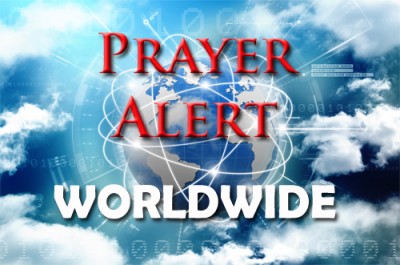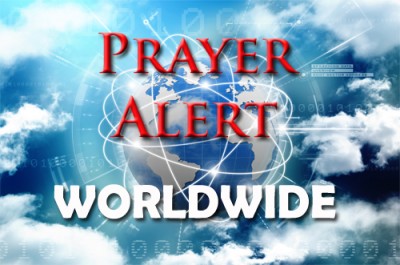Coronavirus in the 10/40 Window
13 Aug 2020Cities with significant pandemic outbreaks are the same ones that are consistently affected by other seasonal respiratory viruses, such as flu. 10/40 Window countries are primarily in North Africa, the Middle East, India, and Southern Asia. That’s two-thirds of the world’s population. Three out of every five people have no access to the Gospel and they are predominantly the poorest of the poor; they enjoy fewer advantages than their more affluent neighbours. There is limited access to skilled nursing care and appropriate medicines to treat ailments. Many families live crammed together in one room. Six feet separation is unrealistic. Consequently there will be higher rates of infections and deaths than in the more developed nations. Young people are sometimes the worst offenders in failing to take proper precautions. Pray that they will take the responsibility and lead the way in controlling the spread of coronavirus (1 Timothy 4:12).
USA: pro-life film removed from Amazon Prime
13 Aug 2020A pro-life filmmaker is claiming censorship after his documentary was removed from Amazon Prime video ‘because of poor customer reviews’ despite the film receiving overwhelmingly positive reviews. Marcus Pittman’s movie, ‘Babies are Still Murdered Here,’ goes into the deep underpinnings of major national lobbyist groups. It asks why after 46 years babies are still being murdered. Amazon categorises reviews based on keywords: some keywords were pro-life, end abortion and pro-life movement. This may be why the film was removed. Amazon has faced allegations of censorship before. Last year it pulled books describing how a relationship with Jesus Christ helped people out of same-sex attractions, saying it was in ‘violation of our content guidelines’, but did not point out which parts were objectionable.
- Food/Hot meals targeting vulnerable internally displaced people for next 30 days
- Medicine/ gap coverage for those who lost their homes and are in need of medicine and minor medical expenses
- Rehab of destroyed homes/ Boarding up busted windows and doors
- Street and home cleanups
- For a well-coordinated relief response and that both the local and international NGOs will cooperate and work together in a synergistic manner to provide rapid and effective assistance.
- The healing of the nation as it is deeply wounded and that the church will rise and fulfill its purpose and be a light in the midst of darkness.
- For the rioting and violence to stop and for God’s peace and order to prevail.
- That the Islamic agenda will not be able to be implemented.
- For an independent judicial system that is not under political power so that corruption could be judged.
- For the economic situation in Lebanon to be resolved and Lebanon to become prosperous again.
- That the promises of God for Lebanon (being transformed in a moment into a fertile field) will be fulfilled.
- That the many Syrian refugees who are in Lebanon will be able to go back home.
Walk and Pray in lockdown
06 Aug 2020The Walk and Pray resource which the Evangelical Alliance released during lockdown has proved to be one of their most popular downloads to date, showing that many people have indeed been ‘looking up’ to the Lord for help during this time. Consequently, they have released a sequel, Walk, Pray, Talk, a five-part resource that will help people to explore prayer through the themes of being people of God, present to God and people, participation, and caring for a place.
Lebanon: Christian broadcaster offers solace
06 Aug 2020The only Arabic Christian television broadcaster in Lebanon is airing special live programming, reassuring shell-shocked viewers after the huge Beirut explosion on 4 August. The next day, SAT-7 broadcast a special Arabic-language programme - the Pain and Hope. Local Christian leaders Rev Dr Hikmat Kashouh and Dr Nabil Costa offered reassurance to viewers, and prayed live on air for the families of those killed in the explosion, for those who are missing, and for the injured. Christian TV programmes will continue to provide a platform for grieving and traumatised viewers in Lebanon to find comfort and seek prayer in the disaster aftermath, while continuing to minister to a country beset by political strife, economic collapse, hunger, and social unrest. Lebanese people are looking for others to stand with them grief and in prayer in the wake of this catastrophe. Christian broadcasting offers genuine hope.
Migrant arrivals hitting crisis levels
06 Aug 2020Last month you prayed for compassionate provisions for refugees (see). Now Tony Smith, the former head of UK Border Force, said that if the UK and France fail to agree joint Channel patrols, arrivals will reach crisis levels. He said, ‘They need to agree a treaty with a joint patrol where migrants picked up in the Channel can be returned to France to have asylum claims considered there. What I'm advocating is we try as best we can to replicate the juxtaposed controls for legitimate applicants in the same way as for illegitimate applicants. Over 200 migrants managed to cross to Britain in twenty boats in one day. If they want to come to the UK they need to make their case on the French side, and if they are found in the waterways or even make it as far as Dover we say, “I'm sorry but you go back there and that's where you will be interviewed and processed, on the French side”.’
Church used as a cannabis farm
06 Aug 2020A URC church in Staffordshire, a Grade 2 listed building from 1820 next door to a primary school, had not been used as a place of worship for over twenty years. Then 400 cannabis plants were found growing inside. A police raid at the end of July uncovered the drugs, and a man has appeared in court. This is the second recent finding of a cannabis farm in an unused church as local communities are being overrun by illegal drugs. Fears of gang violence and muggings keep frightened residents at home. Open dealing on the street stirs parents’ fears for their children. Pray for God to help citizens and community groups to recognise the roles they can play helping authorities eradicate the problem. Pray also for addicts to receive support and help to find a path away from substance abuse.
Nearly one in five private renting parents are now more concerned their family will become homeless as a result of the Covid crisis, new research from Shelter shows (see). As the country moves out of lockdown, the chronic lack of social housing has left struggling families with few options to escape the insecurity of private renting. A third of parents who rent from private landlords are more negative about their long-term housing situation. Shelter reported that 49,000 have resorted to using foodbanks since lockdown and cut back on food to help pay rent; 550,000 took on debt (overdrafts, credit cards, payday loans, borrowing from bank/family/friends) to help pay rent since lockdown. Pray for people in poverty to have a home they can afford. See also the next article, ‘Outdated Planning System’.







